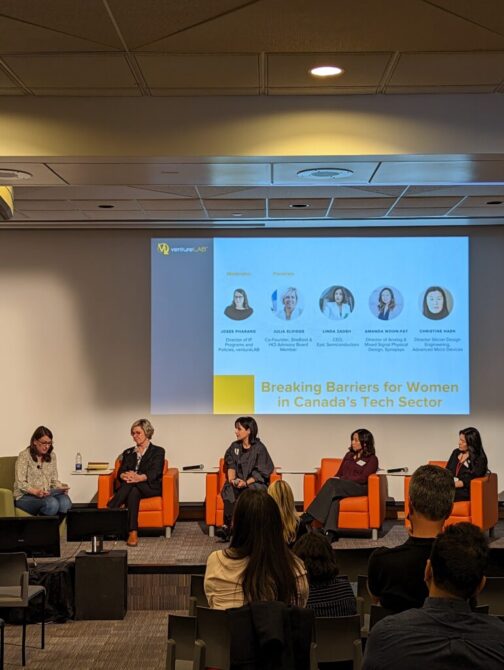
Women in tech world celebrated at ventureLAB event
By Sadi Muktadir, editor, Canadian Manufacturing
Electronics News Technology ventureLAB women in techImportant work being done to help hire, promote women in leadership positions
ventureLAB, an organization focused on cultivating start-ups in the advanced manufacturing space, hosted an event to celebrate key leaders in technology at its Toronto-area location recently. The event was meant to highlight women in STEM who have advanced their careers, and the important work being done to help hire and promote more women into leadership positions in the hardware and semiconductor industry.
The half-day event featured a keynote address from Erin Bury, the CEO and co-founder of Willful, a website with an online tool meant to help people with estate planning and legal issues. Erin described her journey as a leader in the tech and start-up space, and how she launched and took inspiration from sources around her.
In launching Willful, Erin listed four key qualities that she felt made a successful entrepreneur. That being open-mindedness, taking risk, resilience, and flexibility.

ventureLAB’s Women in Tech event celebrates key leaders in advanced manufacturing.
ventureLAB has a background in working with start-ups led by women, and this was emphasized by Melissa Chee, the CEO in her opening remarks, when she spoke about the need for businesses to promote more diversity if they wanted to be successful. Increasing the number of women in leadership positions in the tech industry, and specifically the semiconductor industry, was the focus of the next session.
Female panel members
The panel was titled ‘Breaking Barriers for Women in Canada’s Tech Sector’ and was moderated by ventureLAB’s Josée Pharand. The discussion featured Julia Elvidge, Co-founder of She Boot, Amanada Woon-Fat, group director of analog & mixed signal physical design at Synopsys, Christine Haen, director of hardware design engineering at AMD and Linda Zadeh, founder and CEO of EPIC Semiconductors.
The moderator Josée Pharand listed some tech employment statistics, stating that studies have shown that only 21% of Canadian companies have a woman in a C-suite role. With that in mind, the women were asked what actions were being taken and what could be taken to help improve some of these statistics.
Extremely important to speak unintimidated
Amanda Woon-Fat, group director at Synopsys said, “I’m often the only women in the meeting in a senior role. I try and advocate if there’s a meeting where I don’t see a lot of diversity represented, or if someone can contribute in a different way, I try and bring another woman in.”
Julia Elvidge co-founder at She Boot added onto this, by saying “I’m in meetings now where I’ve been the only woman in attendance. Having been through a career where I was often the only woman in the room, I knew I didn’t want to go back to that.”
Linda Zadeh, CEO of EPIC Semiconductors mentioned that there was still a need to fight for space. “It’s extremely important to speak unintimidated. Whether you’re right or wrong, don’t think about it too much. Speak up.”
Bring value into those meetings
Christine Haen, director of hardwire design engineering at AMD, responded to this.
“I am in those meetings where I’m a quieter person. And I have felt like I didn’t belong. It’s important to raise your own self-awareness, and value, and bring that value into those meetings. Realizing that through a mentor has helped me be more comfortable in those scenarios.”
The women were also asked about the various programs at their organizations and the work being done to advance women into more senior positions. All of them mentioned mentorship programs and specific initiatives that were in effect to address the gap.
More work for diverse and marginalized groups
The women were then asked if they felt it was their responsibility to help more women advance their careers in the semiconductor industry and all of them seemed in agreement about what Amanada Woon Fat had to say.
“I kind of push back on the responsibility piece,” says Amanda Woon Fat. “There’s clearly a problem, and I let others know, ‘do you want to make a difference in solving it?’ I try and remind everyone and let them know so it’s shared.”
Amanda described a scenario where the responsibility of advancing more women in their careers leads to more work for diverse and marginalized groups, saddled with more responsibilities than their male counterparts.
25% of women in tech roles
The panel discussion and half-day event provided a forum for women in tech to discuss the important work that still needs to be done in the semiconductor space, and the achievements that have taken place.
This important work still yet to be done was reflected in Julia Elvidge’s closing comments when asked what made her hopeful about the future of women in tech.
“What makes me hopeful? I’m not. I’m a little peeved still,” she says. “25% of women in tech roles is a number that hasn’t changed much in twenty years. We need more women running tech companies, because that will create an environment where more women will want to work in tech.”
